- Home
- Best Pet for Me
- Are Ferrets Good Pets?
Are Ferrets Good Pets? Your Guide to Adopting and Caring for a Ferret
 Photo by Evgeniya Litovchenko: https://www.pexels.com/photo/a-woman-holding-a-ferret-9083445/
Photo by Evgeniya Litovchenko: https://www.pexels.com/photo/a-woman-holding-a-ferret-9083445/Are ferrets good pets? They are charming and energetic little creatures, but they require special care. and may not be for everyone.
The are closely related to weasels and are often considered exotic pets due to their unique characteristics and playful nature.
Before you decide to adopt a ferret, it’s important to note that they are banned in some places, so it’s crucial to check your local regulations to ensure that owning one is legal in your area.
While these pets can make delightful companions, their care and behavior require careful consideration.
Like cats and dogs, ferrets are obligate carnivores, meaning they need a diet rich in animal protein to stay healthy. They thrive on meat-based foods, which are essential for their digestive system and overall well-being. This is an important aspect of their care that potential ferret owners must be aware of before bringing them home, as providing the right nutrition is key to ensuring a long, healthy life for your pet.
In addition to their dietary needs, ferrets come with another consideration that may not be immediately obvious: their distinct odor.
Ferrets have a natural musk, and even though many are spayed or neutered to reduce the scent, they can still carry a noticeable smell. Regular grooming and proper cage maintenance can help mitigate the odor, but it’s something that prospective owners should be prepared for.
Unlike more traditional pets like dogs or cats, the smell of a ferret is a part of their natural biology, and it may not be to everyone's liking. Are ferrets good pets if they smell? Maybe you'll learn to love their smell, maybe not. That is a big consideration before you adopt.
Ferrets are also incredibly curious and active animals, requiring ample space to explore, play, and exercise. Their playful nature can lead them to get into mischief, so ferret-proofing your home is essential to keep them safe.
If you're looking for a pet that enjoys interactive play, ferrets can be a fantastic choice, as they love games and mental stimulation.
Before adopting a ferret, it’s important to do thorough research to ensure you understand both the rewards and responsibilities of owning one. From their unique diet to their scent and playful temperament, ferrets are not your typical pet.
However, for those who are prepared to meet their needs, they can be incredibly rewarding companions, offering a lot of personality and affection in return. Are ferrets good pets for you? Read on and find out what is involved in ferret care.
Creating the Perfect Home for Your Ferret: Cage Setup, Safety, and Care Tips
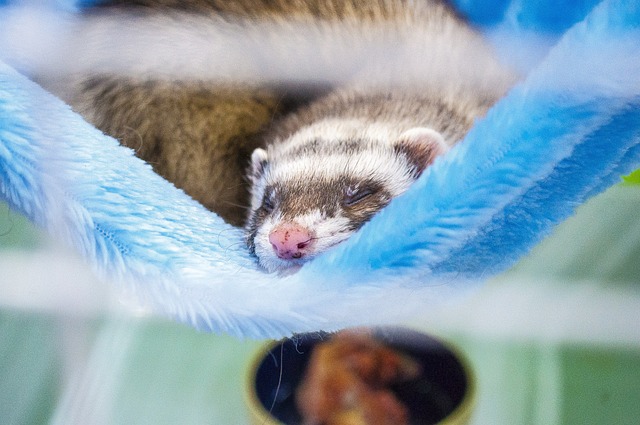 Image by Юрий Кузнецов from Pixabay
Image by Юрий Кузнецов from PixabayWhile ferrets do sleep a lot, when they are awake they really want to run around. There should be plenty of levels with ramps and ladders in their cage.
The cage for one should measure at least 18 inches by 18 inches by 30 inches. Wire cages are best, but make sure the spaces between the wires are narrow because ferrets are escape artists. The floor should be carpet, wood, or linoleum - a wire floor will hurt their feet.
They need hammocks, shelves, and a dark hidey in their cage.
They like a cool climate, and will not do well if temperatures go over 80 degrees F. They should be kept in the shade and definitely out of direct sunlight.
They should have lots of supervised playtime outside of their cage. They need a lot of exercise.
Ferrets will chew on everything, make themselves small to escape, and can be pretty messy.
Cover under doors, keep windows closed, and watch out for dryer vents, and any other place they may hide.
If you have a recliner chair, always check for a ferret before you recline.
Check in the oven for a ferret before you turn it on. Likewise with the washer. You get the picture.
Electrical cords and anything plastic, foam, or rubber should be kept out of their reach.
They can get stomach blockages if they ingest foam.
Choosing the Right Bedding for Your Ferret: Comfort, Cleanliness, and Safety
 https://commons.wikimedia.org/wiki/File:Frettchen_Hankensb%C3%BCttel%E2%80%9320200821_(3).jpg
https://commons.wikimedia.org/wiki/File:Frettchen_Hankensb%C3%BCttel%E2%80%9320200821_(3).jpgWhen it comes to bedding for ferrets, paper bedding is often considered the ideal choice, as it’s soft, absorbent, and comfortable for them to snuggle in.
However, make sure the paper bedding you choose doesn’t contain any toxic inks or chemicals that could harm your pet. Aspen shavings are another excellent option for ferret bedding, as they are safe, absorbent, and provide a cozy environment for your pet.
Bedding serves two main purposes for your ferret: it gives them a comfortable space to sleep and relax, and it helps keep their litter box clean if you have trained them to use it.
Having the right bedding is essential not only for their comfort but also for maintaining good hygiene in their living space. Make sure to change the bedding regularly and spot clean the litter box to keep your ferret's environment fresh and odor-free.
Feeding Your Ferret: Proper Diet, Treats, and Hydration Tips
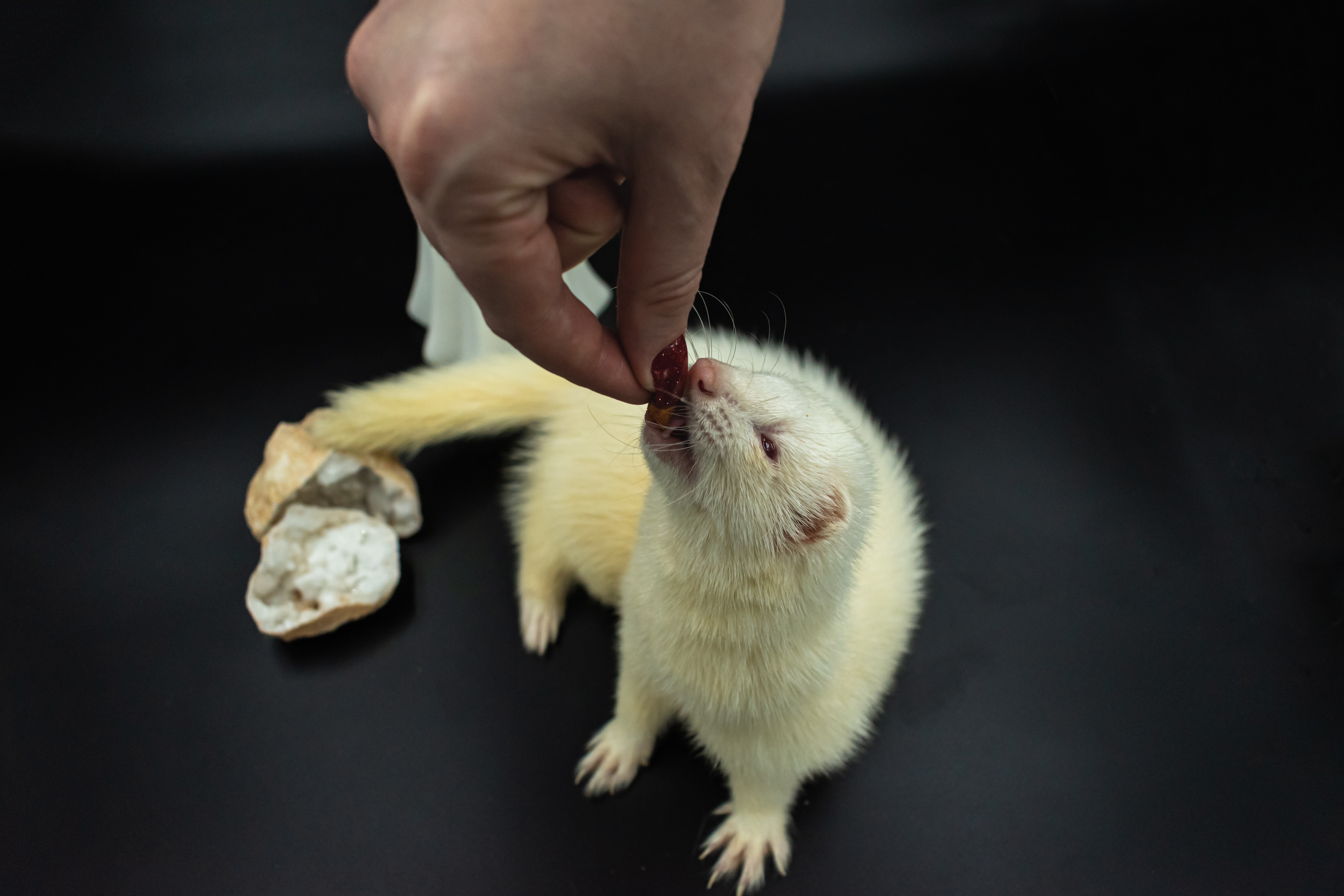 Photo by Nikolett Emmert: https://www.pexels.com/photo/woman-hand-feeding-white-ferret-15470443/
Photo by Nikolett Emmert: https://www.pexels.com/photo/woman-hand-feeding-white-ferret-15470443/Ferrets can make fascinating and engaging pets, but caring for them requires understanding their unique dietary needs.
One of the most important things to know is that ferrets are obligate carnivores, meaning their diet must be meat-based. Unlike many pets, they cannot process fiber or carbohydrates well, and fruits and vegetables are not suitable for their digestion.
Many commercially available ferret treats often contain ingredients that aren’t ideal for their health, so it’s crucial to be selective about what you feed them.
If you’re wondering, Are ferrets good pets? the answer depends on your ability to meet their nutritional needs. Ferrets absolutely love meat, and giving them a small piece of meat as a treat will usually make them very happy.
You can also purchase specially formulated ferret food that’s designed to meet all their nutritional needs. If you’re in a pinch, high-quality cat food can serve as an emergency substitute since it’s meat-based and can provide the necessary protein.
However, it’s important to avoid feeding them foods like vegetables or fruit, as they can upset their delicate digestive systems.
Ferrets have very small digestive tracts, which means they process food quickly. After eating, they typically poop every 3 to 4 hours, so you’ll need to stay on top of their feeding schedule.
Due to their rapid digestion, ferrets require more frequent meals than many other pets. This fast metabolism is why ferrets need to be fed several times a day, with a focus on high-protein foods to keep their energy levels up.
When it comes to hydration, ferrets need plenty of fresh water each day. A large, spill-proof bowl is the best option for providing water, as water bottles do not dispense enough liquid at once to keep up with their needs.
Ferrets generally require about a cup of water daily to stay hydrated, so be sure to check their water regularly and refill it as needed. Keeping them hydrated is as important as feeding them the right food to ensure they stay healthy and active.
In conclusion, ferrets are fascinating and rewarding pets, but they come with specific dietary and care requirements. If you’re considering adopting a ferret, be prepared to meet their meat-centric diet, provide plenty of fresh water, and feed them more frequently than you might other pets.
These factors will help ensure that your ferret is happy, healthy, and thriving in your home.
So, are ferrets good pets? Absolutely—but only if you’re ready to meet their unique needs.
Sociability, Activity, and Toys: Keep Your Ferret Happy and Engaged
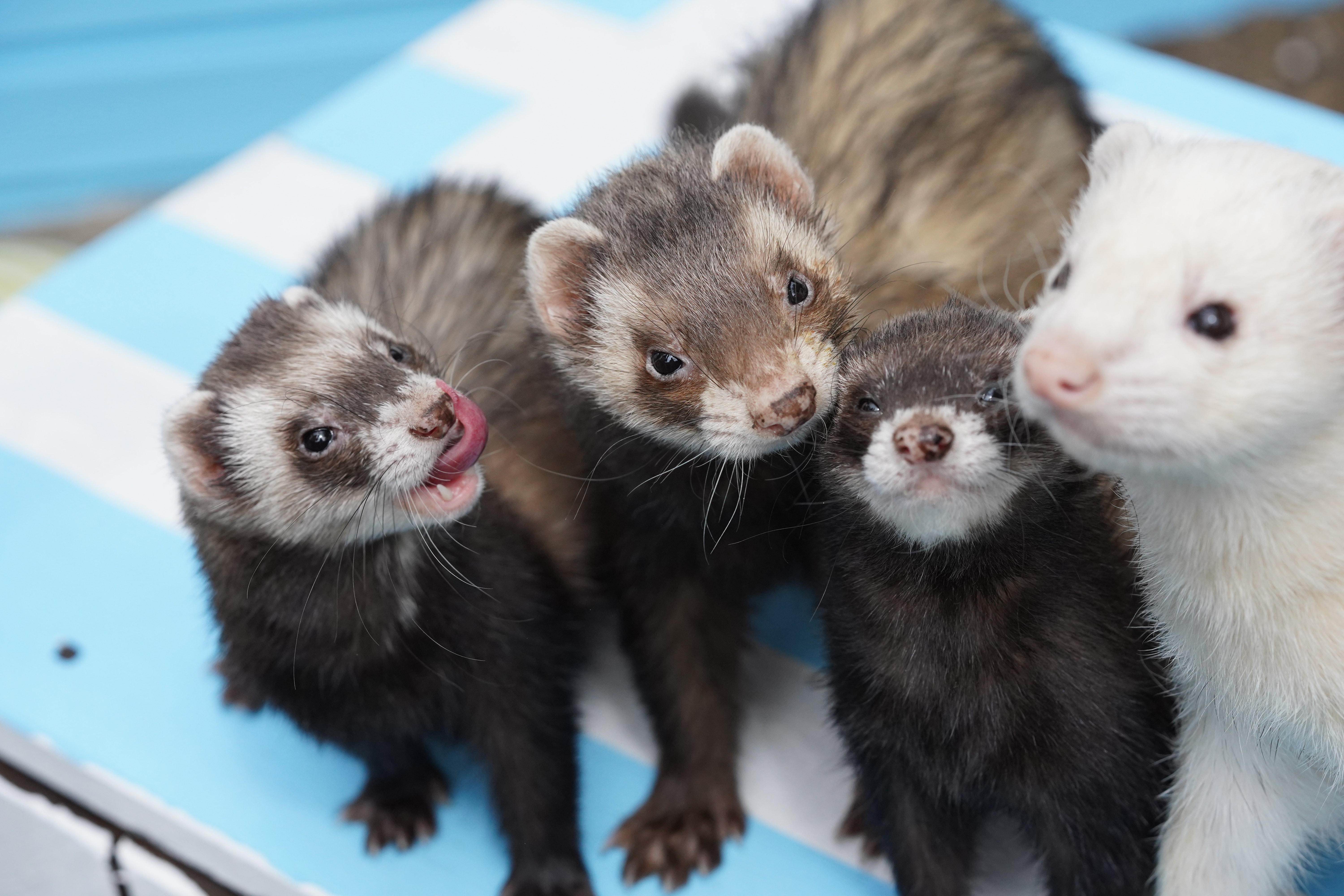 Photo by Verina: https://www.pexels.com/photo/white-and-brown-rodent-on-the-table-7179720/
Photo by Verina: https://www.pexels.com/photo/white-and-brown-rodent-on-the-table-7179720/Many people get two ferrets at the same time. They like having friends and the two of them can keep each other occupied so they don’t get bored.
A little ferret family of up to four might work well in a home that is set up for them to get plenty of exercise.
You can sterilize ferrets, or “de-sex” them. Make sure both ferrets get equal access to food, water, and toys. If you are introducing two ferrets, do it slowly and carefully.
Some ferrets are loners, so having only one is not necessarily a bad thing for a particular ferret. You will have to stand in as a playful friend, though.
Ferrets chew like it’s nobody’s business. Be careful of foam or rubber toys because the ferret will eat those and it could cause a blockage in their digestive tract.
Keep them away from plastic because they will chew on that as well. Really make sure that the area they play in is ferret-proof - nothing they can chew on that would be dangerous, no way to sneak out, lots of great toys to play with, and space to run around in. If they are stuck in their cage all the time, they will get obese and unhappy.
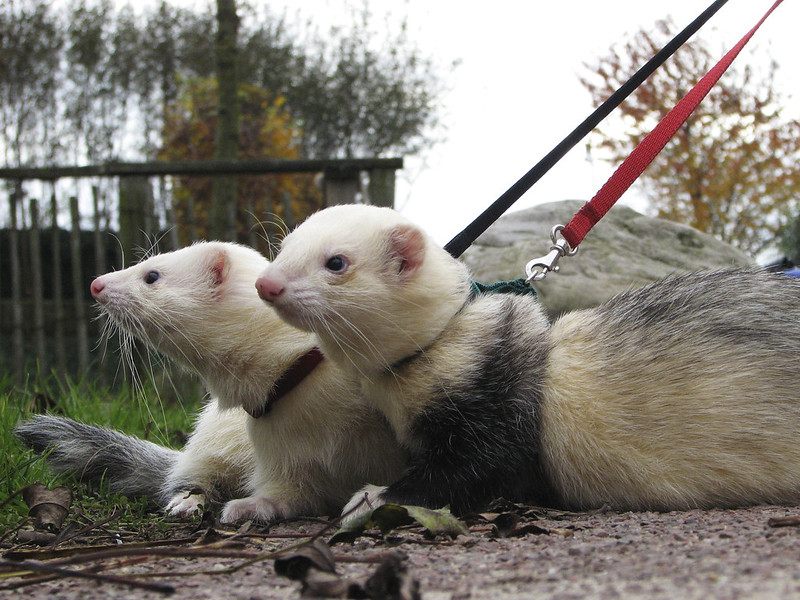 Photo by Hans Splinterhttps://www.flickr.com/photos/archeon/1929555740
Photo by Hans Splinterhttps://www.flickr.com/photos/archeon/1929555740Some people put a harness on their ferret and take their pet for a walk.
Or you might say that the ferret takes the human for a walk because they pretty much go wherever they want.
Ferrets will collect things, so if you are missing some socks, keys, or other objects, you probably left them out during ferret playtime and your pet sequestered them away. Provide them with balls, toys on a string, PVC or cardboard tubes, paper bags, and other toys to play with, burrow in, and climb on.
Biting is something they do to indicate they want to play. It may be hard to train them to not bite you, and a ferret bite can hurt a lot, so be careful. If handled carefully, many ferrets become quite cuddly
Keep your ferret away from small pets like kittens, rabbits, or guinea pigs because the ferret will try to eat them. They will probably not get along with cats or dogs because they can be territorial.
Ferrets are extremely quiet and rarely make any noise. They are most active at dawn and at dusk.
They like to pee and poop in a corner, so it is easy to find a place to put their litterboxes. Just find a corner and reward them for using the box if you can. Clay litter is too dusty for them and clumping litter will stick to them. Paper litter is the best for them, and they are least likely to chew on paper than anything else.
Understanding Your Ferret's Size: What to Expect from This Playful Pet
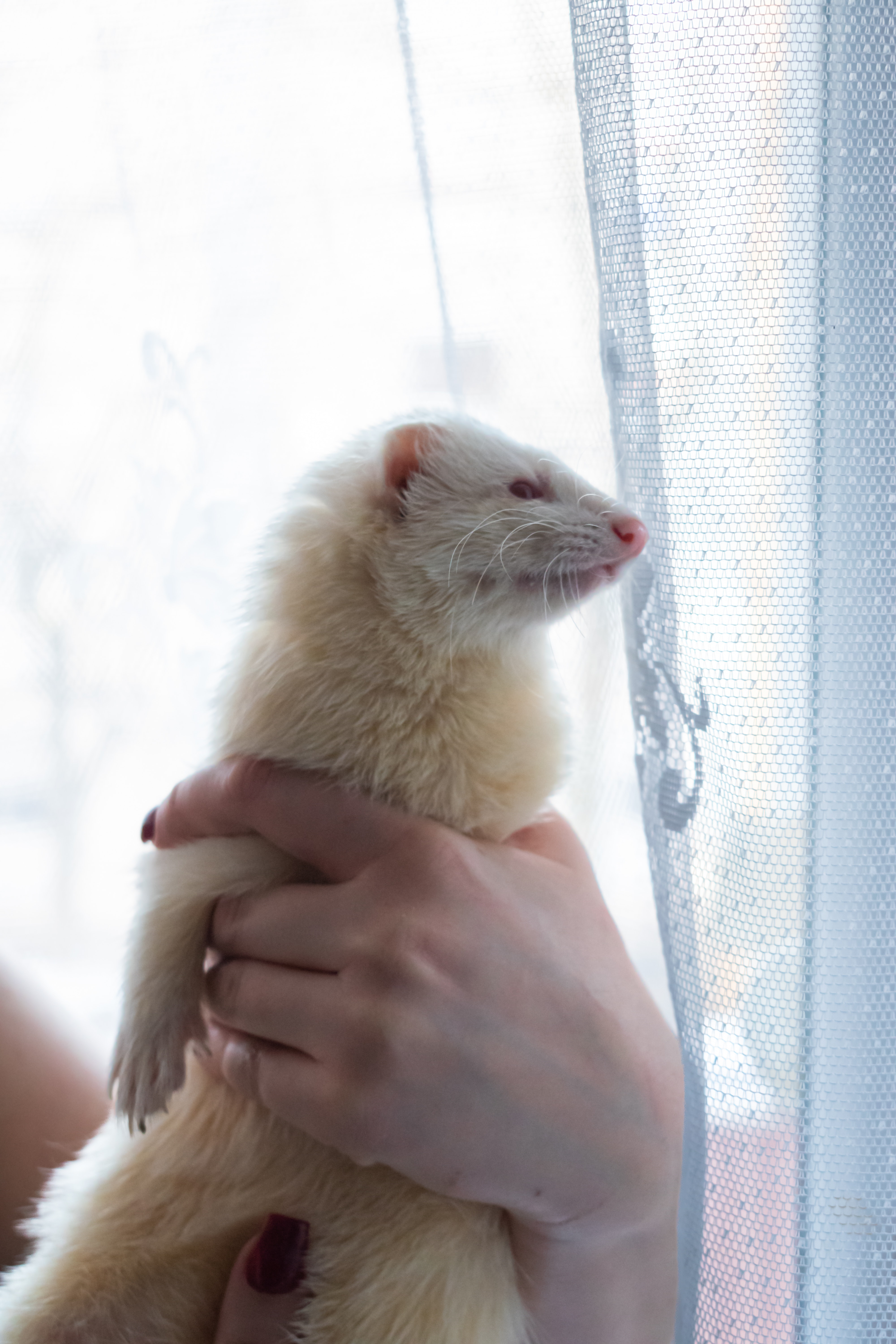 Photo by Nikolett Emmert: https://www.pexels.com/photo/white-ferret-in-hands-15470442/
Photo by Nikolett Emmert: https://www.pexels.com/photo/white-ferret-in-hands-15470442/Ferrets are small yet energetic animals, typically measuring about 20 inches in length, including their tails.
This size makes them relatively compact, but don’t let their small stature fool you—they are packed with personality and curiosity. Depending on their gender and overall health, ferrets generally weigh between 1.5 to 5 pounds, with males tending to be larger than females.
This size difference is common in many animal species, but regardless of gender, ferrets’ personalities are what truly stand out.
So, are ferrets good pets? Absolutely, but only if you can keep up with their boundless energy and need for stimulation.
Despite their size, ferrets are highly active creatures that require plenty of space to explore and play. Their adventurous spirit and playful nature make them seem much larger than their physical size.
Their long, slender bodies and fluffy tails add to their charm, making them both fun to watch and interact with.
Understanding your ferret’s size is essential when setting up their living environment. A cage or play area that accommodates their length, while giving them plenty of room to run, climb, and explore, is vital.
Ferrets love to engage in quick, energetic bursts of activity, and they are often able to squeeze into tight spaces or make unexpected escapes. Therefore, having an environment that supports their playful nature is key to ensuring their well-being.
Whether male or female, your ferret’s size is just one aspect of their dynamic nature. If you’re considering adopting one, remember that they need more than just physical space—they also require mental stimulation through toys, interaction, and exploration.
With the right care and attention, your ferret will thrive and bring joy to your life for many years to come. So, are ferrets good pets? They certainly can be, as long as you’re ready to meet their energetic and playful needs!
Are Ferrets Good Pets? Lifespan, Health, Grooming, and Managing Their Unique Smell
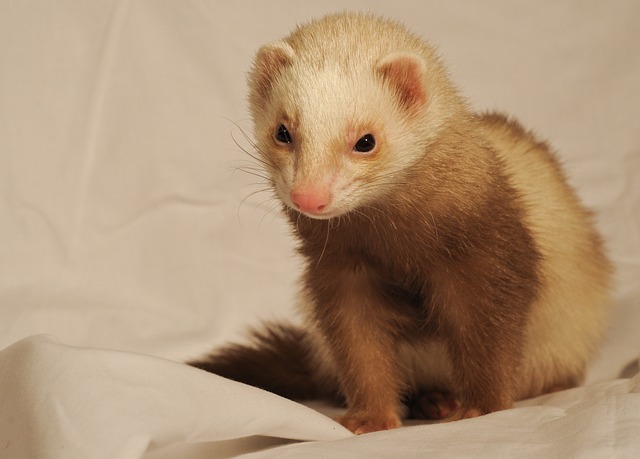 Image by Christel SAGNIEZ from Pixabay
Image by Christel SAGNIEZ from PixabayFerrets generally live for about 5 to 10 years, making them long-term companions that require consistent care throughout their lives.
Regular veterinary visits are crucial to ensuring they remain healthy. It’s recommended that ferrets be seen by a vet at least once a year for check-ups and vaccinations, including rabies, distemper, and other common diseases.
Once your ferret reaches the age of three, annual blood tests are advised, and for ferrets over the age of five, bi-annual visits are important to keep track of any potential health issues.
Due to extensive domestication and inbreeding, ferrets are prone to certain health conditions. Common issues include adrenal gland tumors, pancreatic cancer, and heart disease in older ferrets.
They are also susceptible to fleas, worms, and other parasites, so it’s essential to stay on top of their health through regular veterinary care and preventive treatments.
Neutering is highly recommended for ferrets, especially females. Female ferrets that go into heat can remain in that state until they become pregnant, which can cause significant discomfort, irritation, and even lead to health complications. Neutering your ferret helps alleviate these issues, and males tend to have a less intense odor post-neutering.
When it comes to grooming, ferrets are generally good at keeping themselves clean and don’t require frequent baths. In fact, bathing them too often can dry out their skin.
However, they can sometimes develop hairballs from grooming, so brushing your ferret regularly can help reduce this. It’s also important to check their ears and trim their nails from time to time.
One notable aspect of owning a ferret is their distinctive musky odor. While neutering and removing scent glands can help reduce the intensity of the smell, it won’t eliminate it entirely.
Ferrets have a natural scent that remains despite cleaning and de-scenting efforts. While you may find this smell endearing, it’s important to consider that others, particularly neighbors or people in nearby apartments, may not appreciate it as much.
Caring for a ferret involves more than just meeting their basic needs—it requires attention to their health, grooming, and comfort. You have to inderstand all that goes into taking care of these animals to answer the question are ferrets good pets.
Understanding these factors will help ensure a happy and healthy life for your ferret while making sure you’re prepared for the responsibilities that come with being a ferret owner.






New! Comments
Have your say about what you just read! Leave me a comment in the box below.